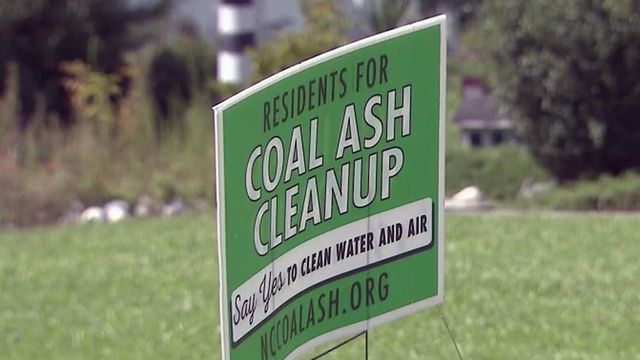Erin Brockovich joins NC coal ash debate
Environmental activist Erin Brockovich is joining the debate over the safety of drinking water from wells near coal ash ponds in North Carolina.
Posted — UpdatedThe state currently uses the federal standard of 100 parts per billion total chromium for drinking water. That includes chromium-3, a naturally occurring element necessary in small quantities for human health, and hexavalent chromium, or chromium-6, a carcinogen. State environmental regulators say most wells near coal ash ponds have tested below that level and are therefore safe under the standards used in every state but California.
In 1991, when the federal standard was set, hexavalent chromium was known to cause cancer when inhaled, but it wasn’t known to cause cancer if ingested. However, in 2007, research by the National Institutes of Health toxicology experts found a link between ingesting hexavalent chromium and cancer in mice and rats. The EPA has been studying the issue ever since, but hasn’t yet moved to tighten its standards.
"We write with deep concern about this continued delay," Brockovich and Environmental Working Group President Ken Cook wrote in the letter. "It is clear that the delay is sowing confusion among state and local regulators, utilities and the public about how much hexavalent chromium is safe in drinking water. This confusion is resulting many Americans’ exposure to unregulated levels of hexavalent chromium, which federal, state and independent scientists agree pose health hazards."
The state, guided by Department of Health and Human Services scientist Ken Rudo, issued "do not drink" orders last year for hundreds of wells located near ash ponds, citing levels of hexavalent chromium that exceeded 0.07 parts per billion, which equates to a one-in-a-million lifetime cancer risk. The letters were rescinded this year, with state environmental and public health officials saying that threshold was too stringent and that the federal standard was appropriate.
"North Carolina uses the drinking water standard that is deemed safe by the Obama administration and is used to regulate drinking water in 49 states," said DEQ spokeswoman Stephanie Hawco.
The confusion has created a rift within Gov. Pat McCrory's administration and deep mistrust of the administration by people living near coal ash ponds.
"Even our governor is, he's, he's (saying), 'Oh, there's nothing wrong with it. There's nothing wrong with the chromium in the water. You can drink it. It's safe,'" Carolyn McLamb said Monday. "No. With all the sickness I've seen, no, I don't think it's safe to drink."
McLamb, now 64, has lived for 46 years next to the coal ash ponds at the H.F. Lee plant outside Goldsboro, one of the Duke Energy sites slated to be excavated after multiple citations for leaks into the Neuse River.
As teens and young adults, McLamb said, people in her community used to wade, swim and even fish in the coal ash ponds. While the plant was still burning coal, she says, her husband, Terry, used to have to brush the coal ash off his car every morning.
Since then, McLamb said, her husband has had a stroke, four heart attacks, kidney and bowel disease and mental illness and is disabled. She said her husband's cousin, who lived nearby, died at age 17 of leukemia.
"There's a lot of sickness, a lot of sickness," she said. "Not just my family. Every family that has lived in that area has had some kind of leukemia, some kind of cancer, some kind of mental illness, and ... chromium does cause mental illness. I have looked that up."
The wavering on the safety of the water led the McCrory administration to accuse Rudo of lying under oath in a deposition in a lawsuit over coal ash cleanup and going rogue to set his own safety standards for hexavalent chromium. That criticism prompted Dr. Megan Davies to resign last week as state epidemiologist, saying state officials were misleading the public about Rudo's efforts to protect people.
Brockovich has been commenting on social media on the North Carolina controversy, saying she thinks the scientists who sent the "do not drink" letters got it right the first time.
"States like North Carolina, where industrial byproducts like coal ash increase the risk of hexavalent chromium contamination, need a federal mandate to set strong, health-protective standards for levels of the contaminant in drinking water," Brockovich and Cook wrote in their letter. "Without it, states will continue to use inconsistent and potentially unsafe guidelines and leave citizens confused about whether their drinking water is safe."
McLamb agrees that the EPA needs to set a standard for hexavalent chromium in drinking water.
"They should've already done something. We shouldn't have had to wait this long," she said.
Duke Energy, the owner of the coal ash ponds in Rosewood, denies that the ponds have contaminated local wells.
"Duke Energy maintains that extensive science and engineering have not indicated a connection between plant operations and results of plant neighbor well samples associated with do-not-drink advisories from the state," said spokesman Jeff Brooks.
Related Topics
• Credits
Copyright 2024 by Capitol Broadcasting Company. All rights reserved. This material may not be published, broadcast, rewritten or redistributed.





